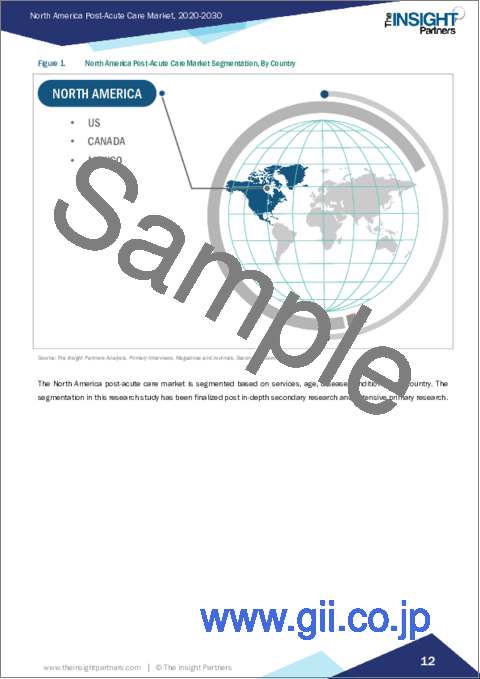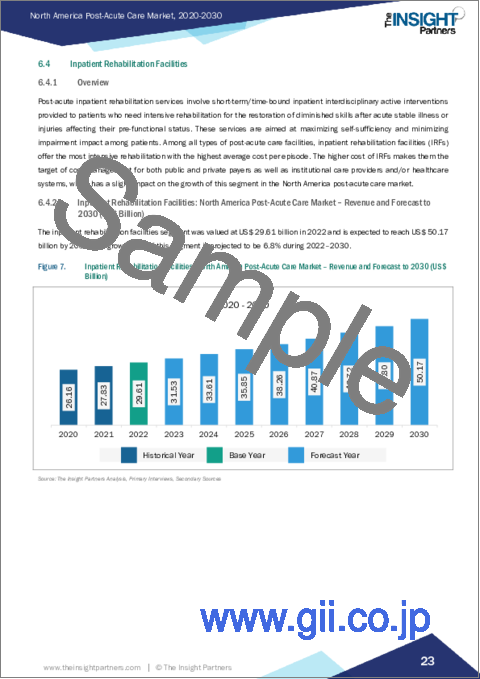|
|
市場調査レポート
商品コード
1562249
北米のポストアキュートケア市場の2030年予測- 地域別分析- サービス別、年齢別、疾患別North America Post-Acute Care Market Forecast to 2030 - Regional Analysis - by Services, Age, and Disease Conditions |
||||||
|
|||||||
| 北米のポストアキュートケア市場の2030年予測- 地域別分析- サービス別、年齢別、疾患別 |
|
出版日: 2024年07月04日
発行: The Insight Partners
ページ情報: 英文 78 Pages
納期: 即納可能
|
全表示
- 概要
- 図表
- 目次
北米のポストアキュートケア市場は、2022年に2億8,120万米ドルと評価され、2030年には4億6,858万米ドルに達すると予測され、2022年から2030年までのCAGRは6.6%と予測されます。
新興国市場における在宅ヘルスケア志向が北米のポストアキュートケア市場を活性化
世界保健機関(WHO)は、在宅ケアを「心理社会的、身体的、緩和ケア活動を含む、自宅で人々に提供される一連のサービス」と定義しています。長期施設、入院リハビリテーション、熟練看護施設から在宅ケア設定へのシフトは、クラウドとモビリティ駆動型医療機器の台頭の高まりにより、患者と医師とのより良い、一貫性のある、タイムリーな相互作用の可能性をより大きくします。COVID-19危機は、限られた病床容量と熟練した医療専門家の不足のため、ヘルスケアにおけるAIの重要性を引き起こし、在宅ケアがさらに重視されるようになりました。患者のバイタルを遠隔監視することで、ヘルスケア専門家はヘルスケア施設への入院を避けることができます。バーチャルな方法で対応できれば、ベッドはクリティカルケアが必要な患者だけに確保することができ、病院管理者はリソースをより効果的に管理することができます。在宅ケアは、傷の手当て、注射、点滴栄養療法などの熟練した看護ケアを含む、患者の自宅内での幅広い急性期後ケアサービスを含みます。また、理学療法、作業療法、言語療法も含まれます。
発展途上国では、これまで在宅療法を受ける患者の数は限られていました。病院は電子カルテ(EHR)統合や投薬安全ソフトウェアなどの機能を統合したスマート機器を急速に導入していますが、在宅サービス提供者の大半は従来型の機器を使い続けています。しかし、これらの国々はヘルスケア・インフラとサービスの改善に注力しており、ヘルスケア・セクターが提供するサービスのアップグレードを促しています。さらに、研究開発への多額の投資は、新興諸国における製品やサービスの技術的アップグレードに重要な役割を果たしています。このような先進的な医療サービスの利用が可能になりつつあることから、これらの国々では今後、在宅医療の現場での利用が増加する可能性が高いです。このように、在宅ヘルスケアへの嗜好の高まりは、北米のポストアキュートケア市場において有益な動向として浮上しています。
北米のポストアキュートケア市場概要
北米のポストアキュートケア市場は、米国、カナダ、メキシコに区分されます。技術的に先進的な製品の受け入れ拡大、研究開発活動の活発化、大規模ヘルスケア企業の存在、手術後の急性期後ケア施設の利用拡大などが、北米の急性期後ケア市場の成長を促進している主な要因です。米国疾病予防管理センター(CDC)によると、毎年約73万5,000人のアメリカ人が心臓発作を起こしており、そのうち52万5,000人の患者が初めて心臓発作を起こし、21万人の患者は過去にすでに心臓発作を起こしています。米国国勢調査局によると、米国では75歳以上の250万人が大動脈弁狭窄症を患っており、75歳以上人口の12.4%を占めています。米国心臓協会の雑誌に掲載された論文によると、僧帽弁閉鎖不全症は米国で最も頻度の高い弁膜症です。75歳以上のほぼ10人に1人が罹患しています。米国では心血管疾患患者や老年人口に対する急性期後のケアサービスの需要が高く、同国の市場を牽引しています。
北米のポストアキュートケア市場の収益と2030年までの予測(金額)
北米のポストアキュートケア市場のセグメンテーション
北米のポストアキュートケア市場は、サービス別、年齢別、疾患別、国別に区分されます。
サービス別に見ると、北米のポストアキュートケア市場は、熟練看護施設、入院リハビリテーション施設、長期療養型病院、在宅医療機関、その他に区分されます。2022年には在宅医療機関が最大のシェアを占めています。
年齢別では、北米のポストアキュートケア市場は高齢者、成人、その他に区分されます。2022年には高齢者セグメントが最大のシェアを占めています。
疾患別では、北米の急性期後ケア市場は切断、創傷管理、脳損傷・脊髄損傷、神経障害、その他に区分されます。神経疾患分野が2022年に最大のシェアを占めました。
国別に見ると、北米のポストアキュートケア市場は米国、カナダ、メキシコに分類されます。2022年の北米のポストアキュートケア市場は米国が支配的でした。
Amedisys Inc、Covenant Care California LLC、Sonoma Post Acute、Victoria Post Acute、Mission Hills Post Acute Care、Vineyard Post Acute、Brookdale Senior Living Inc、The Alden Network、AdventHealth、Bella Vista Health Centerなどが北米のポストアキュートケア市場で事業を展開する主要企業です。
目次
第1章 イントロダクション
第2章 エグゼクティブサマリー
- 主要な洞察
第3章 調査手法
- 調査範囲
- 2次調査
- 1次調査
第4章 北米のポストアキュートケア市場:主要産業力学
- 市場促進要因
- 戦略的イニシアチブの増加
- 老年人口における手術件数と術後ケア要件の増加
- 市場抑制要因
- 熟練労働力の不足
- 市場機会
- 技術の進歩によるポストアキュートケアの統合
- 今後の動向
- 新興諸国における在宅ヘルスケアへの傾斜
- 影響分析
第5章 ポストアキュートケア市場:北米市場分析
- 北米のポストアキュートケア市場収益、2022年~2030年
第6章 北米のポストアキュートケア市場:2030年までの収益と予測:サービス別
- 北米のポストアキュートケア市場の売上高シェア(%)サービス別、(2022年・2030年)
- 熟練看護施設
- 入院リハビリテーション施設
- 長期療養病院
- 在宅医療機関
- その他
第7章 北米のポストアキュートケア市場:2030年までの収益と予測:年齢別
- 北米のポストアキュートケア市場の売上高シェア(%)年齢別、(2022年・2030年)
- 高齢者
- 成人
- その他
第8章 北米のポストアキュートケア市場:2030年までの収益と予測:疾患別
- 北米のポストアキュートケア市場の売上高シェア(%)疾患別、(2022年・2030年)
- 切断
- 創傷管理
- 脳・脊髄損傷
- 神経疾患
- その他
第9章 北米のポストアキュートケア市場:国別分析
- 北米
- 米国
- カナダ
- メキシコ
第10章 業界情勢
- 市場参入企業の成長戦略
第11章 企業プロファイル
- Amedisys Inc
- Covenant Care California LLC
- Sonoma Post Acute
- Victoria Post Acute
- Mission Hills Post Acute Care
- Vineyard Post Acute
- Brookdale Senior Living Inc
- The Alden Network
- AdventHealth
- Bella Vista Health Center
第12章 付録
List Of Tables
- Table 1. North America Post-Acute Care Market Segmentation
- Table 2. US North America Post-Acute Care Market, by Services - Revenue and Forecast to 2030 (US$ Billion)
- Table 3. US North America Post-Acute Care Market, by Age - Revenue and Forecast to 2030 (US$ Billion)
- Table 4. US North America Post-Acute Care Market, by Disease Conditions - Revenue and Forecast to 2030 (US$ Billion)
- Table 5. Canada North America Post-Acute Care Market, by Services - Revenue and Forecast to 2030 (US$ Billion)
- Table 6. Canada North America Post-Acute Care Market, by Age - Revenue and Forecast to 2030 (US$ Billion)
- Table 7. Canada North America Post-Acute Care Market, by Disease Conditions - Revenue and Forecast to 2030 (US$ Billion)
- Table 8. Mexico North America Post-Acute Care Market, by Services - Revenue and Forecast to 2030 (US$ Billion)
- Table 9. Mexico North America Post-Acute Care Market, by Age - Revenue and Forecast to 2030 (US$ Billion)
- Table 10. Mexico North America Post-Acute Care Market, by Disease Conditions - Revenue and Forecast to 2030 (US$ Billion)
- Table 11. Developments Done By Companies
- Table 12. Glossary of Terms, North America Post-Acute Care Market
List Of Figures
- Figure 1. North America Post-Acute Care Market Segmentation, By Country
- Figure 2. North America Post-Acute Care Market - Key Industry Dynamics
- Figure 3. Impact Analysis of Drivers and Restraints
- Figure 4. North America Post-Acute Care Market Revenue (US$ Bn), 2022 - 2030
- Figure 5. North America Post-Acute Care Market Revenue Share, by Services, 2022 & 2030 (%)
- Figure 6. Skilled Nursing Facilities: North America Post-Acute Care Market - Revenue and Forecast to 2030 (US$ Billion)
- Figure 7. Inpatient Rehabilitation Facilities: North America Post-Acute Care Market - Revenue and Forecast to 2030 (US$ Billion)
- Figure 8. Long-Term Care Hospitals: North America Post-Acute Care Market - Revenue and Forecast to 2030 (US$ Billion)
- Figure 9. Home Health Agencies: North America Post-Acute Care Market - Revenue and Forecast to 2030 (US$ Billion)
- Figure 10. Others: North America Post-Acute Care Market - Revenue and Forecast to 2030 (US$ Billion)
- Figure 11. North America Post-Acute Care Market Revenue Share, by Age, 2022 & 2030 (%)
- Figure 12. Elderly: North America Post-Acute Care Market - Revenue and Forecast to 2030 (US$ Billion)
- Figure 13. Adults: North America Post-Acute Care Market - Revenue and Forecast to 2030 (US$ Billion)
- Figure 14. Others: North America Post-Acute Care Market - Revenue and Forecast to 2030 (US$ Billion)
- Figure 15. North America Post-Acute Care Market Revenue Share, by Disease Conditions, 2022 & 2030 (%)
- Figure 16. Amputations: North America Post-Acute Care Market - Revenue and Forecast to 2030 (US$ Billion)
- Figure 17. Wound Management: North America Post-Acute Care Market - Revenue and Forecast to 2030 (US$ Billion)
- Figure 18. Brain Injury and Spinal Cord Injury: North America Post-Acute Care Market - Revenue and Forecast to 2030 (US$ Billion)
- Figure 19. Neurological Diseases: North America Post-Acute Care Market - Revenue and Forecast to 2030 (US$ Billion)
- Figure 20. Others: North America Post-Acute Care Market - Revenue and Forecast to 2030 (US$ Billion)
- Figure 21. North America Post-Acute Care Market, by Key Country - Revenue (2022) (US$ Billion)
- Figure 22. North America Post-Acute Care Market, By Key Countries, 2022 and 2030 (%)
- Figure 23. US North America Post-Acute Care Market Revenue and Forecast to 2030 (US$ Bn)
- Figure 24. Canada North America Post-Acute Care Market Revenue and Forecast to 2030 (US$ Bn)
- Figure 25. Mexico North America Post-Acute Care Market Revenue and Forecast to 2030 (US$ Bn)
The North America post-acute care market was valued at US$ 281.20 million in 2022 and is expected to reach US$ 468.58 million by 2030; it is estimated to register at a CAGR of 6.6% from 2022 to 2030.
Inclination Toward Home Healthcare in Developing Countries Fuels North America Post-Acute Care Market
The World Health Organization (WHO) defines home-based care as a series of services provided to people in their homes, which include psychosocial, physical, or palliative care activities. A shift from long-term facilities, inpatient rehabilitation, and skilled nursing facilities to home care settings results in greater chances of better, consistent, and timely interaction between patient and doctor owing to the growing prominence of cloud and mobility-driven medical devices. The COVID-19 crisis has triggered the importance of AI in healthcare due to limited hospital bed capacity and a scarcity of skilled healthcare professionals, which further emphasizes on home-based care. By monitoring the patient's vitals remotely, healthcare professionals can avoid admissions to healthcare facilities. If the cases can be handled virtually, beds are reserved only for patients requiring critical care, which allows hospital administrations to manage their resources more effectively. Home care entails a wide range of post-acute care services within the patient's home, including skilled nursing care for wounds, injections, or IV nutrition therapy. It also encompasses physical, occupational, and speech therapies.
In developing countries, the number of patients receiving home therapy has been limited in the past. Although hospitals have rapidly adopted smart devices integrated with features such as electronic health records (EHR) integration and medication safety software, the majority of home service providers continue to use traditional devices. However, these countries are focused on improving their healthcare infrastructure and services, which is encouraging the healthcare sector to upgrade their offerings. Moreover, significant investments in research and development play a key role in the technological upgrading of products and services in emerging countries. With the increasing availability of such advanced medical offerings, their use is likely to rise in the homecare settings in these countries in the future. Thus, the growing preference for home healthcare is emerging as a beneficial trend in the North America post-acute care market.
North America Post-Acute Care Market Overview
The North America post-acute care market has been segmented into the US, Canada, and Mexico. The increasing acceptance of technologically advanced products, a rise in research and development activities, the presence of large healthcare businesses, and the growing use of post-acute care facilities after surgery are among the key factors propelling the growth of the North America post-acute care market in North America. According to the Centers for Disease Control and Prevention (CDC), nearly 735,000 Americans have a heart attack every year, out of which 525,000 patients have had a first heart attack while 210,000 patients have already had a heart attack in the past. According to the US Census Bureau, 2.5 million people in the US over the age of 75 suffer from aortic stenosis, accounting for 12.4% of the population over 75 years of age. According to an article published in the American Heart Association's journal, mitral regurgitation is the most frequent valve disease in the US. It affects nearly 1 in 10 people who are 75 years or older. There is a high demand for post-acute care services in patients with cardiovascular diseases and the geriatric population in the US, driving the market in the country.
North America Post-Acute Care Market Revenue and Forecast to 2030 (US$ Million)
North America Post-Acute Care Market Segmentation
The North America post-acute care market is segmented based on by services, age, disease conditions, and country.
Based on by services, the North America post-acute care market is segmented into skilled nursing facilities, inpatient rehabilitation facilities, long-term care hospitals, home health agency, and others. The home health agency segment held the largest share in 2022.
In terms of age, the North America post-acute care market is segmented into elderly, adult, and others. The elderly segment held the largest share in 2022.
By disease conditions, the North America post-acute care market is segmented into amputations, wound management, brain injury and spinal cord injury, neurological disorders, and others. The neurological disorders segment held the largest share in 2022.
Based on country, the North America post-acute care market is categorized into the US, Canada, and Mexico. The US dominated the North America post-acute care market in 2022.
Amedisys Inc, Covenant Care California LLC, Sonoma Post Acute, Victoria Post Acute, Mission Hills Post Acute Care, Vineyard Post Acute, Brookdale Senior Living Inc, The Alden Network, AdventHealth, and Bella Vista Health Center are some of the leading companies operating in the North America post-acute care market.
Table Of Contents
1. Introduction
- 1.1 The Insight Partners Research Report Guidance
- 1.2 Market Segmentation
2. Executive Summary
- 2.1 Key Insights
3. Research Methodology
- 3.1 Coverage
- 3.2 Secondary Research
- 3.3 Primary Research
4. North America Post-Acute Care Market - Key Industry Dynamics
- 4.1 Market Drivers:
- 4.1.1 Rising Number of Strategic Initiatives
- 4.1.2 Increasing Number of Surgeries and Post-Surgery Care Requirements in Geriatric Population
- 4.2 Market Restraints
- 4.2.1 Lack of Skilled Workforce
- 4.3 Market Opportunities
- 4.3.1 Consolidation of Post-Acute Care with Technological Advancements
- 4.4 Future Trends
- 4.4.1 Inclination toward Home Healthcare in Developing Countries
- 4.5 Impact Analysis:
5. Post-Acute Care Market - North America Market Analysis
- 5.1 North America Post-Acute Care Market Revenue (US$ Bn), 2022 - 2030
6. North America Post-Acute Care Market - Revenue and Forecast to 2030 - by Services
- 6.1 Overview
- 6.2 North America Post-Acute Care Market Revenue Share, by Services, 2022 & 2030 (%)
- 6.3 Skilled Nursing Facilities
- 6.3.1 Overview
- 6.3.2 Skilled Nursing Facilities: North America Post-Acute Care Market - Revenue and Forecast to 2030 (US$ Billion)
- 6.4 Inpatient Rehabilitation Facilities
- 6.4.1 Overview
- 6.4.2 Inpatient Rehabilitation Facilities: North America Post-Acute Care Market - Revenue and Forecast to 2030 (US$ Billion)
- 6.5 Long-Term Care Hospitals
- 6.5.1 Overview
- 6.5.2 Long-Term Care Hospitals: North America Post-Acute Care Market - Revenue and Forecast to 2030 (US$ Billion)
- 6.6 Home Health Agencies
- 6.6.1 Overview
- 6.6.2 Home Health Agencies: North America Post-Acute Care Market - Revenue and Forecast to 2030 (US$ Billion)
- 6.7 Others
- 6.7.1 Overview
- 6.7.2 Others: North America Post-Acute Care Market - Revenue and Forecast to 2030 (US$ Billion)
7. North America Post-Acute Care Market - Revenue and Forecast to 2030 - by Age
- 7.1 Overview
- 7.2 North America Post-Acute Care Market Revenue Share, by Age, 2022 & 2030 (%)
- 7.3 Elderly
- 7.3.1 Overview
- 7.3.2 Elderly: North America Post-Acute Care Market - Revenue and Forecast to 2030 (US$ Billion)
- 7.4 Adults
- 7.4.1 Overview
- 7.4.2 Adults: North America Post-Acute Care Market - Revenue and Forecast to 2030 (US$ Billion)
- 7.5 Others
- 7.5.1 Overview
- 7.5.2 Others: North America Post-Acute Care Market - Revenue and Forecast to 2030 (US$ Billion)
8. North America Post-Acute Care Market - Revenue and Forecast to 2030 - by Disease Conditions
- 8.1 Overview
- 8.2 North America Post-Acute Care Market Revenue Share, by Disease Conditions, 2022 & 2030 (%)
- 8.3 Amputations
- 8.3.1 Overview
- 8.3.2 Amputations: North America Post-Acute Care Market - Revenue and Forecast to 2030 (US$ Billion)
- 8.4 Wound Management
- 8.4.1 Overview
- 8.4.2 Wound Management: North America Post-Acute Care Market - Revenue and Forecast to 2030 (US$ Billion)
- 8.5 Brain and Spinal Cord Injury
- 8.5.1 Overview
- 8.5.2 Brain Injury and Spinal Cord Injury: North America Post-Acute Care Market - Revenue and Forecast to 2030 (US$ Billion)
- 8.6 Neurological Diseases
- 8.6.1 Overview
- 8.6.2 Neurological Diseases: North America Post-Acute Care Market - Revenue and Forecast to 2030 (US$ Billion)
- 8.7 Others
- 8.7.1 Overview
- 8.7.2 Others: North America Post-Acute Care Market - Revenue and Forecast to 2030 (US$ Billion)
9. North America Post-Acute Care Market - Country Analysis
- 9.1 North America
- 9.1.1 Overview
- 9.1.2 North America Post-Acute Care Market, by Country
- 9.1.2.1 US
- 9.1.2.1.1 Overview
- 9.1.2.1.2 US North America Post-Acute Care Market Revenue and Forecast to 2030 (US$ Bn)
- 9.1.2.1.3 US: North America Post-Acute Care Market, by Services, 2020-2030 (US$ Billion)
- 9.1.2.1.4 US: North America Post-Acute Care Market, by Age, 2020-2030 (US$ Billion)
- 9.1.2.1.5 US: North America Post-Acute Care Market, by Disease Conditions, 2020-2030 (US$ Billion)
- 9.1.2.2 Canada
- 9.1.2.2.1 Overview
- 9.1.2.2.2 Canada North America Post-Acute Care Market Revenue and Forecast to 2030 (US$ Bn)
- 9.1.2.2.3 Canada: North America Post-Acute Care Market, by Services, 2020-2030 (US$ Billion)
- 9.1.2.2.4 Canada: North America Post-Acute Care Market, by Age, 2020-2030 (US$ Billion)
- 9.1.2.2.5 Canada: North America Post-Acute Care Market, by Disease Conditions, 2020-2030 (US$ Billion)
- 9.1.2.3 Mexico
- 9.1.2.3.1 Overview
- 9.1.2.3.2 Mexico North America Post-Acute Care Market Revenue and Forecast to 2030 (US$ Bn)
- 9.1.2.3.3 Mexico: North America Post-Acute Care Market, by Services, 2020-2030 (US$ Billion)
- 9.1.2.3.4 Mexico: North America Post-Acute Care Market, by Age, 2020-2030 (US$ Billion)
- 9.1.2.3.5 Mexico: North America Post-Acute Care Market, by Disease Conditions, 2020-2030 (US$ Billion)
- 9.1.2.1 US
10. Industry Landscape
- 10.1 Overview
- 10.2 Growth Strategies Done by the Companies in the Market
11. Company Profiles
- 11.1 Amedisys Inc
- 11.1.1 Key Facts
- 11.1.2 Business Description
- 11.1.3 Products and Services
- 11.1.4 Financial Overview
- 11.1.5 SWOT Analysis
- 11.1.6 Key Developments
- 11.2 Covenant Care California LLC
- 11.2.1 Key Facts
- 11.2.2 Business Description
- 11.2.3 Products and Services
- 11.2.4 Financial Overview
- 11.2.5 SWOT Analysis
- 11.2.6 Key Developments
- 11.3 Sonoma Post Acute
- 11.3.1 Key Facts
- 11.3.2 Business Description
- 11.3.3 Products and Services
- 11.3.4 Financial Overview
- 11.3.5 SWOT Analysis
- 11.3.6 Key Developments
- 11.4 Victoria Post Acute
- 11.4.1 Key Facts
- 11.4.2 Business Description
- 11.4.3 Products and Services
- 11.4.4 Financial Overview
- 11.4.5 SWOT Analysis
- 11.4.6 Key Developments
- 11.5 Mission Hills Post Acute Care
- 11.5.1 Key Facts
- 11.5.2 Business Description
- 11.5.3 Products and Services
- 11.5.4 Financial Overview
- 11.5.5 SWOT Analysis
- 11.5.6 Key Developments
- 11.6 Vineyard Post Acute
- 11.6.1 Key Facts
- 11.6.2 Business Description
- 11.6.3 Products and Services
- 11.6.4 Financial Overview
- 11.6.5 SWOT Analysis
- 11.6.6 Key Developments
- 11.7 Brookdale Senior Living Inc
- 11.7.1 Key Facts
- 11.7.2 Business Description
- 11.7.3 Products and Services
- 11.7.4 Financial Overview
- 11.7.5 SWOT Analysis
- 11.7.6 Key Developments
- 11.8 The Alden Network
- 11.8.1 Key Facts
- 11.8.2 Business Description
- 11.8.3 Products and Services
- 11.8.4 Financial Overview
- 11.8.5 SWOT Analysis
- 11.8.6 Key Developments
- 11.9 AdventHealth
- 11.9.1 Key Facts
- 11.9.2 Business Description
- 11.9.3 Products and Services
- 11.9.4 Financial Overview
- 11.9.5 SWOT Analysis
- 11.9.6 Key Developments
- 11.10 Bella Vista Health Center
- 11.10.1 Key Facts
- 11.10.2 Business Description
- 11.10.3 Products and Services
- 11.10.4 Financial Overview
- 11.10.5 SWOT Analysis
- 11.10.6 Key Developments
12. Appendix
- 12.1 About Us
- 12.2 Glossary of Terms






